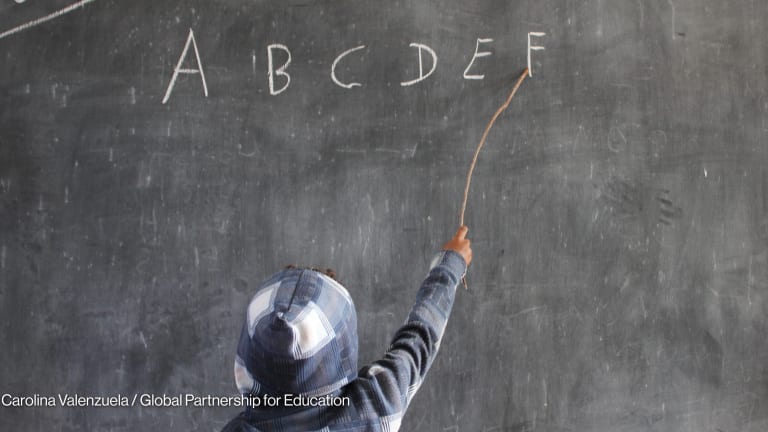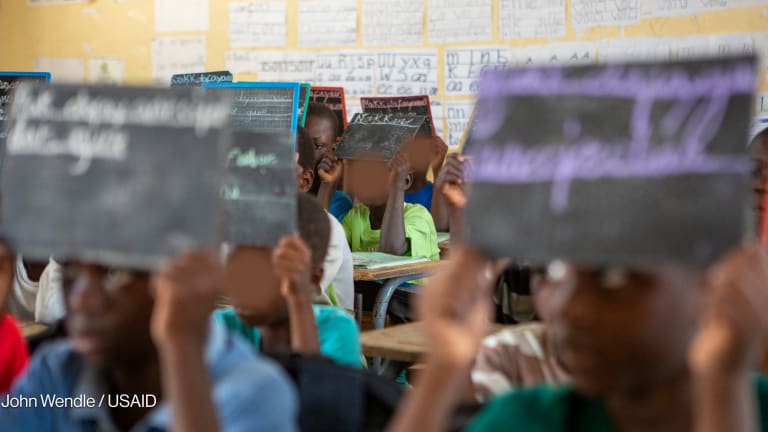
When it comes to educating the world’s most vulnerable children — and girls especially — the international community has collectively failed.
Visionary billionaires, global business, aid organizations, donor governments, you name it, we have let down kids in poor and war-torn countries.
There are 124 million children today, the majority of them girls, who find themselves deprived of primary and lower secondary schooling — a number that has soared because of the surge in violent conflicts currently fueling Europe’s refugee crisis.
So far, however, there is no Bill or Melinda Gates for international education.
Incredibly, financing for basic learning is falling.
But it doesn’t have to be this way. There is a proven approach that has already worked. Philanthropists, private foundations and development institutions, the United States, the United Kingdom, and the European Union have banded together over the past 10 years to dramatically improve the health of the poorest children.
See more stories on global education:
► The hard questions in education: Why and how?
► Wanted: The 'Bill Gates for education'
► Why the SDGs don't add up without math and science education
► UNESCO assigns homework on education targets
► Top aid donors failing to invest enough in global education
Vaccination programs in some of the least developed countries on earth have had spectacular results, setting millions of youngsters up for survival and wellbeing that should endure for generations.
Now more than ever, we cannot forget the next vital steps.
After these same children turn 5, immunized against preventable diseases such as measles or polio, they urgently need the opportunity to start and stay in good schools for a quality education. Only then will their full personal and professional potential be realized. Only then will they be empowered to lift themselves out of poverty.
The handsome sums of money and innovation well-targeted on poor children’s health, now need to be similarly channeled towards ensuring these immunized kids’ enrolment in school, with the kind of teaching standards and strong education systems we take for granted in the rich world.
Last week at the U.N. General Assembly in New York, 193 world leaders committed to 17 new global goals for sustainable development to end extreme poverty, fight inequality and injustice, and protect our planet by 2030.
Education is essential to the success of every one of these goals. Without the building block of universal schooling the rest are just unachievable.
So who will pay for us to reach this lofty aspiration and how can it be realistically achieved?
Unfortunately the sector I represent as CEO of the Global Partnership for Education — bringing together 60 developing countries, donor governments, international organizations, and the private sector, foundations, teachers and civil society — remains the poor cousin in development assistance.
Hundreds of millions of children around the world don’t make it to grade four or they get there without even the most rudimentary skills in reading, writing and math.
All the best efforts on health could count for little in the long-term if every child’s right to go to school and learn from well-trained teachers continues to be denied, because they are poor, happen to be a girl, live in a conflict zone, are disabled, are persecuted for their religion or ethnicity, or several of the above like Pakistan's Nobel Peace Prize laureate and girls’ education champion Malala Yousafzai.
Commendably, the United Nations has acknowledged the gravity of the crisis — or as UNESCO figures show there is a $39 billion shortfall to get every child in developing countries into school for a full education. This is already taking into account increased funding by developing countries themselves. Thirty-nine billion dollars is what’s still required annually over the next 15 years on top of current funding.
If we don’t change course, UNESCO estimates it will take almost a century before all children in sub-Saharan Africa complete lower secondary school. Disturbingly, it will be the girls who get there last, with the poorest girls completing lower secondary school 70 years after the richest boys.
Contrary to the stereotype, poor countries have been stepping up to the challenge.
A growing number of our partners in Africa, Asia and Latin America, are devoting more of their government’s budgets to education, with the ultimate goal of one-fifth of public outlays. Regrettably, as many developing countries gradually ramped up education spending, external aid for the sector dropped by almost 8 percent between 2010 and 2013.
Still, more money is not the simple answer. A new Bill or Melinda Gates and more multilateral and national government aid will not alone solve the problem. The Global Partnership for Education, which has allocated $4.3 billion since 2002, including $2 billion to countries in conflict, is taking a long-term view, transforming the fragmented model for delivering aid dollars to education.
We are pioneering a unique, results-based financing model that gives incentives to low-income countries to undertake educational reforms that will last, and reassures donors like the United States that precious aid is being spent well.
Accountability is central with 70 percent of our grants being based on financially sustainable education sector plans. The remaining 30 percent depend on developing countries tracing a clear path towards concrete improvements in learning quality, efficiency and equity for every child.
We need to invest with a greater focus on outcomes.
Now is the time to scale-up action and funding for education — with philanthropists and private foundations as well as traditional aid sources and developing countries themselves showing the money.
We must guarantee that by 2030 we will reach the target of universal basic education for all.
Join the Devex community and access more in-depth analysis, breaking news and business advice — and a host of other services — on international development, humanitarian aid and global health.








